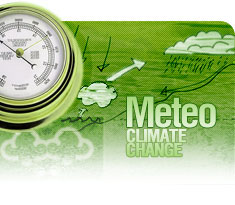http://news.yahoo.com/climate-change-slow-transatlantic-flights-study-000623387.html
Winds bolstered by climate change will slow flights between North America and Europe, boosting fuel costs and carbon dioxide (CO2) emissions -- which caused the problem in the first place, researchers said Wednesday.
Climate change will speed up the jet stream, a high-altitude wind blowing from west to east across the Atlantic ocean, they wrote in the Institute of Physics journal Environmental Research Letters.
"The bad news for passengers is that westbound flights will be battling against stronger headwinds," study leader Paul Williams, an atmospheric scientist at the University of Reading, said in a statement.
"The good news is that eastbound flights will be boosted by stronger tailwinds, but not enough to compensate for the longer westbound journeys. The net result is that roundtrip journeys will significantly lengthen."
Williams and a team used climate model simulations to predict wind changes and fed these into a flight routing programme.
They based their modelling on a doubling in the pre-industrial CO2 concentration of 280 particles per million (ppm) in the atmosphere.
The current level is about 400 ppm, and 560 ppm could already be reached this century if countries fail to dramatically cut back emissions from the burning of coal, oil and gas.
- 'Record-breaking times' -
The team calculated that average jet-stream winds between Heathrow airport in London and New York's John F. Kennedy, would become 15 percent faster in winter.
"As a result, London-bound flights will become twice as likely to take under five hours and 20 minutes, implying that record-breaking crossing times will occur with increasing frequency in future," the authors said.
"On the other hand, New York-bound flights will become twice as likely to take over seven hours, suggesting that delayed arrivals will become increasingly common."
Even assuming no growth in aviation, this would mean an additional 2,000 flight hours every year, the team said.
This would burn an extra 7.2 million gallons of jet fuel at a cost of some $22 million (20 million euros), and emit an additional 70 million kilos (154 million pounds) of carbon dioxide -- equivalent to the annual emissions of 7,100 average British homes.
"This effect will increase the fuel costs to airlines, potentially raising ticket prices, and it will worsen the environmental impacts of aviation," said Williams.
Changes in the jet stream have already been observed -- last year British Airways Flight 114 was carried by strong winds from New York to London in a record five hours and 16 minutes.
Jetliners flying the other way, however, faced powerful headwinds that caused many to make unscheduled refuelling stops.
The scientific jury is still out on whether changes already observed can be blamed on climate change.
Last year, a study also led by Williams said flights will become bumpier as global warming destabilises air currents.



 Română
Română English
English


